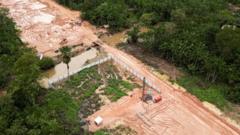In a striking contradiction to its stated climate goals, Brazil is constructing a four-lane highway through protected areas of the Amazon rainforest to facilitate access to the COP30 climate summit in Belém this November. Expected to draw over 50,000 attendees, including world leaders, the highway has sparked controversy among local communities and environmental advocates who argue it undermines the summit's purpose.
Best known as Avenida Liberdade, the roadway stretches over 13 kilometers (8 miles), leading through a once-thriving ecosystem, now marred by piles of felled trees and construction equipment. Local resident Claudio Verequete, who relies on the açaí berry harvest from the now-cleared land, expressed his despair over the loss of his livelihood and fears for the region's future. "Everything was destroyed," he lamented, highlighting the lack of compensation from the state and his community's disconnection from the planned highway.
Critics, including wildlife researchers, warn of detrimental impacts on local biodiversity. With the area rendered more accessible, the risk of further deforestation increases, and the fragmented habitats could hinder wildlife movement. Professor Silvia Sardinha, a vet at a wildlife rehabilitation center, noted the loss of natural areas for animal release, signaling an additional blow to the region’s ecological integrity.
Despite assurances from state officials that the project boasts "sustainable" credentials—with promises of wildlife crossings and bike lanes—many feel that the local voices and their needs are being overshadowed by high-level discussions at the upcoming summit. Adler Silveira, the infrastructure secretary, defended the project by citing its potential mobility benefits and a legacy of modernization for the citizens of Belém.
While the developments offer potential future economic opportunities, as expressed by local business owners in the city’s market, the ecological costs are evident. João Alexandre Trindade da Silva, a vendor of herbal medicines, reflected on the dual nature of progress, emphasizing the hopes for genuine actions stemming from high-stakes discussions at COP30. Meanwhile, global scrutiny intensifies over whether the carbon footprint of hosting such an event undermines the climate activism it endeavors to promote.
As the summit looms, the juxtaposition of infrastructure development against the backdrop of deforestation calls into question the commitment to genuine, impactful climate solutions. The question remains—can the plans for the COP30 stand alongside the ecological preservation of the Amazon, or will the highway pave the way for further environmental degradation?
Best known as Avenida Liberdade, the roadway stretches over 13 kilometers (8 miles), leading through a once-thriving ecosystem, now marred by piles of felled trees and construction equipment. Local resident Claudio Verequete, who relies on the açaí berry harvest from the now-cleared land, expressed his despair over the loss of his livelihood and fears for the region's future. "Everything was destroyed," he lamented, highlighting the lack of compensation from the state and his community's disconnection from the planned highway.
Critics, including wildlife researchers, warn of detrimental impacts on local biodiversity. With the area rendered more accessible, the risk of further deforestation increases, and the fragmented habitats could hinder wildlife movement. Professor Silvia Sardinha, a vet at a wildlife rehabilitation center, noted the loss of natural areas for animal release, signaling an additional blow to the region’s ecological integrity.
Despite assurances from state officials that the project boasts "sustainable" credentials—with promises of wildlife crossings and bike lanes—many feel that the local voices and their needs are being overshadowed by high-level discussions at the upcoming summit. Adler Silveira, the infrastructure secretary, defended the project by citing its potential mobility benefits and a legacy of modernization for the citizens of Belém.
While the developments offer potential future economic opportunities, as expressed by local business owners in the city’s market, the ecological costs are evident. João Alexandre Trindade da Silva, a vendor of herbal medicines, reflected on the dual nature of progress, emphasizing the hopes for genuine actions stemming from high-stakes discussions at COP30. Meanwhile, global scrutiny intensifies over whether the carbon footprint of hosting such an event undermines the climate activism it endeavors to promote.
As the summit looms, the juxtaposition of infrastructure development against the backdrop of deforestation calls into question the commitment to genuine, impactful climate solutions. The question remains—can the plans for the COP30 stand alongside the ecological preservation of the Amazon, or will the highway pave the way for further environmental degradation?




















